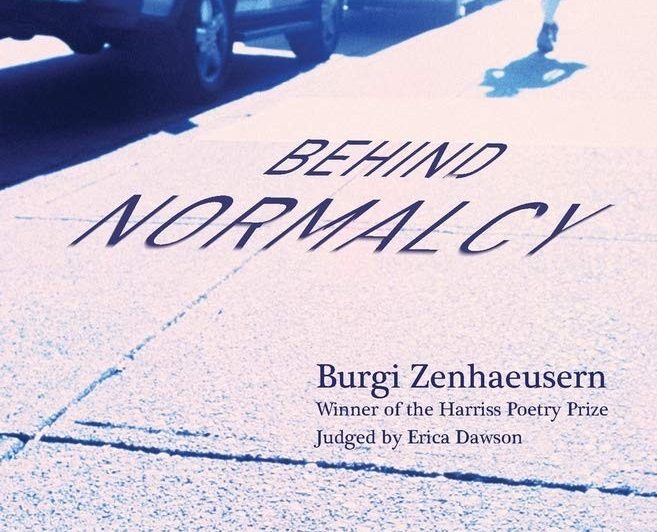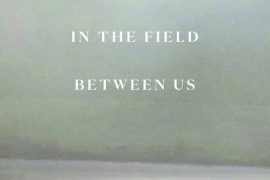There are many things that seem spookily prescient about reading Burgi Zenhaeusern’s Behind Normalcy in the COVID age. There’s the title, which seems to point a finger at the silent, simultaneous progression of the disease, even while this compact book of poems was published in the first months of the year. There’s “Mountain Lake,” whose bitter, unexpected cold
…sheathed
our flailing warmth, thrust us
up to gasp, shriek, or groan,
engulfed in its bursting.
There’s the last poem in the collection and the namesake of the cover photograph, “Rubber Glove”—an item with which we are now all very familiar. (It ends, simply, “I pray”—something I imagine any essential worker doing by rote as they strip off their PPE.) And perhaps most poignantly, there is the dedication: “To the reader. You are a poem’s lungs.”
But perhaps this seeming synergy of clairvoyance and current events isn’t unexpected after all.
Poetry often strips away the “normalcy” of the tiny moments in our lives to shine a trembling light on what they might actually mean. So does crisis. In this way, we can tangibly measure the impact of Zenhaeusern’s writing: by how deeply it speaks to the distillation of daily experience that Covid-19 has created for us all.
The poetry in this book—concise and pointed, rarely ever extending beyond two pages—is filled with these tiny moments and items: flip flops, mirrors, pomegranates, art hung in a first floor laundry room. Words like “dustings,” “glint,” “glimmer,” “shimmer,” “slivers,” and “splinters” are scattered on almost every page, adding to the shifting, mosaic-like quality of Zenhaeusern’s vision. It is a vision that promises us little by way of coziness, as the first scintillating story-poem-memory about Zenhaeusern’s great-aunt tells us outright:
If she smiled we wouldn’t know nor how
Many a sharp retort her expert fingers spun
Into useful yarn, yarn for socks and gloves
For all of us—protection, not comfort.
“Protection, not comfort” could be the motto of these pieces, one which only intensifies as the poems wind through their slim 65 pages. The reader may wonder ultimately who needs protection from whom—by the time we reach the end of the book, Zenhaeusern’s slivers and splinters have become sharp enough to draw blood. “My need to be / forgiven is all / I know,” the poem “Greed” concludes, and “Catch,” a poem I interpret to be about a beloved child’s first real interaction with hatred and pain, takes on full responsibility for the child’s destroyed innocence in a breathtakingly painful ending image: “wonderful / catch in my web of gutted carcasses.”
It would be a mistake, however, to call these poems nihilistic; hopeful beauty abounds in them. Some of their loveliest moments come as Zenhaeusern, a native of Switzerland, uses German Swiss culture and language as yet another lens through which to view her small subjects. “Self-portrait as Granatopfel”1 draws us deeply into the author’s juicy past in a pomegranate orchard, while “portrait of my grandma as a young woman::trees in February” overflows with a gentle, familial love.
The resulting twinned themes of this book—censure and reverence, fear and acceptance, grief and celebration—become our own kaleidoscope, as we simultaneously search for firm footing in the universe while understanding that such a thing may not exist. “[S]o much we can never be sure about / we harvest,” Zenhaeusern writes in “mango.” It reminds me of a family I once saw in the Swiss Alps: father in a cap, mother in an apron, and teens in Converse sneakers and cutoff shorts, all raking field hay into thick blond lines for binding and curing. This was well over 20 years ago, but I still remember it: four tiny people in the shade of sharp blue, looming mountains, using only their hands and their sweat to produce something of use from an unforgivingly beautiful landscape. We can thank Zenhaeusern for having done similarly hard work of bringing her uncertain harvest home to us.
1 “Granatopfel” is German for pomegranate.





